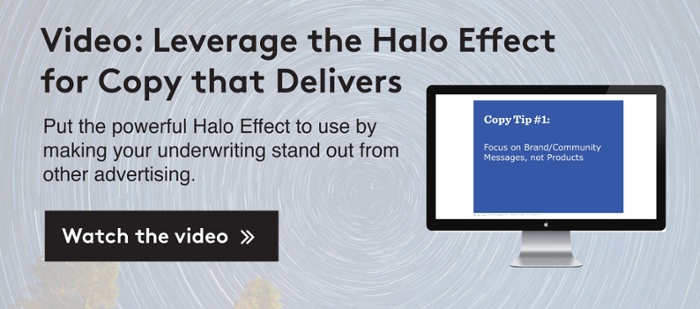Related Articles
Subscribe to the Greater Public newsletter to stay updated.
This site is protected by reCAPTCHA and the Google Privacy Policy and Terms of Service apply.

“A lot of buyers want to get back into TV, radio, out-of-home, and print because they feel like digital can get lost. The most accountable media turned into the least accountable media and the most filled with fraud.”
– Havas CEO Colin Kinsella
Many of us have sensed similar shifting perceptions from buyers about digital advertising. They are aware of ROI limitations in the digital space. And those of us selling radio underwriting often play right into their ambivalence when we don’t use directness, precision, and education about the medium of radio to address their most fundamental question: Will my underwriting work?
Paul Jacobs recently explored this topic in at blog post titled “Can Radio Have Its Cake & Eat It, Too?” He says radio may have an advantage when buyers shimmy back and forth on the question of branding or reach in the digital space. Radio delivers for underwriters in ways that aren’t directly replicated by other options. Here’s how you can speak persuasively to those advantages in your conversations with prospects:
Do we truly understand the broader story of our medium-the story of radio? Radio is a unique medium because of the intimacy and theater of the mind that we invoke. This is particularly true on public radio, when our member listeners put such a high level of trust in our product, whether it’s NPR news or music curation. Listeners almost universally have a picture in their mind of what an on-air announcer looks like. This speaks to their connection to the voice and to us.
Where radio has always been sold as a reach medium, we also offer strong targeting of audience psychographics and “close to the purchase” immediacy. Frequency is a key factor in a radio campaign’s success, and yet too many of us sell it in low frequency schedules. Before you present a 3x/week / 52-week schedule to a client, ask if they are doing this to feel good or to affect their bottom line. I suspect that they want both of those things. It is important that you understand why radio works in order to present something that will actually get results for the client!
[continued below…]
Every marketer wants ROI, and while that is not as easy to prove in our medium, stories are very powerful sales tools. Be sure you can share several success stories from your own clients, your colleague’s clients, even from similar account categories from other markets. Put testimonials on the air and on your website.
Nielsen and Scarborough are the go-to sources, but if you don’t have them, you can use NPR data. You can also pull information on the zip codes of your members, a true measure of your impact and importance.
Help them understand how to best schedule their announcements and write their copy. Be sure to freshen copy regularly; your audience notices when a sponsor runs the same copy for months and months, and it doesn’t make you sound very good. Send clients an MP3 of their announcements, and send them a schedule of when the spots will air. Make your product as tangible as possible.
Share valuable articles that relate to your sponsor’s business. Send customers their way, and tell them that you did. When you get a request from a sponsor, respond right away. Be the rep who is always there for them.
We need to show that we are in the game, and can offer them both the branding and direct response that is the holy grail of marketers. I firmly believe that there is no better place to brand your product than on public media. Today’s buyers want savvy, professional marketing partners that know their stuff. Take the time to be that person and make your client’s priorities your own.


New to Greater Public? Create an account.